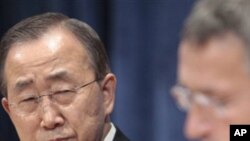The U.N. Secretary-General's High-level Advisory Group on Climate Change Financing has released its recommendations for how the international community can raise $100 billion a year by 2020 to offset the impact of global warming on developing countries. Among the recommendations, the panel is urging increasing the price of carbon emissions.
In February, U.N. Chief Ban Ki-moon established the advisory group and asked Ethiopian Prime Ministers Meles Zenawi and his Norwegian counterpart Jens Stoltenberg, to co-chair it. On Friday, they presented the Secretary-General with the 21 member group's recommendations on how to generate $100 billion a year by 2020 to help address the needs of developing countries in battling the effects of climate change. That target was set at last year's climate conference in Copenhagen.
Their recommendations include raising the price of carbon emissions from between approximately $10 to $25 a ton now, to $20-$25 a ton by 2020. Prime Minister Stoltenberg said carbon pricing makes it profitable to reduce emissions and said it would raise public revenue at the same time. "Pricing emissions has a double positive effect. It both provides incentives for reducing emissions in developed countries and, in addition, it represents a huge potential source for mobilizing revenue for climate actions in the developing countries," he said.
Mr. Stoltenberg said auctioning off emissions allowances and new carbon taxes in developed countries could mobilize an additional $30 billion per year, while carbon pricing of international aviation and shipping and redeployment of fossil fuel subsidies could each raise an additional $10 billion annually.
The Advisory Group says in its report that the $100 billion target is challenging but possible. They say funding will have to come from a variety of sources - public and private, bilateral and multilateral - as well as scaling up of existing sources. They note that financing also needs to be predictable and sustainable.
U.N. Secretary-General Ban Ki-moon said the advisory group's suggestions are "financially feasible and politically viable" and now it is up to governments to consider the options and act.
He said he would send the report to world leaders and it would be up to them to consider the recommendations and implement them.
The international community will meet three weeks from now in Cancun, Mexico to continue climate change talks.
News
UN Panel Urges Measures to Raise Billions for Climate Change Mitigation
